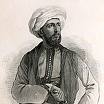Curtis, Longfellow, Schlegel
[This is taken from William Dean Howells' My Literary Passions.]

As usual, I steeped myself in them, and the first runnings of my fancy when I began to pour it out afterwards were of their flavor. I tried to write like this new master; but whether I had tried or not, I should probably have done so from the love I bore him. He was a favorite not only of mine, but of all the young people in the village who were reading current literature, so that on this ground at least I had abundant sympathy. The present generation can have little notion of the deep impression made upon the intelligence and conscience of the whole nation by the ‘Potiphar Papers,’ or how its fancy was rapt with the ‘Prue and I’ sketches, These are among the most veritable literary successes we have had, and probably we who were so glad when the author of these beautiful things turned aside from the flowery paths where he led us, to battle for freedom in the field of politics, would have felt the sacrifice too great if we could have dreamed it would be life-long. But, as it was, we could only honor him the more, and give him a place in our hearts which he shared with Longfellow.
This divine poet I have never ceased to read. His Hiawatha was a new book during one of those terrible Lake Shore winters, but all the other poems were old friends with me by that time. With a sister who is no longer living I had a peculiar affection for his pretty and touching and lightly humorous tale of ‘Kavanagh,’ which was of a village life enough like our own, in some things, to make us know the truth of its delicate realism. We used to read it and talk it fondly over together, and I believe some stories of like make and manner grew out of our pleasure in it. They were never finished, but it was enough to begin them, and there were few writers, if any, among those I delighted in who escaped the tribute of an imitation. One has to begin that way, or at least one had in my day; perhaps it is now possible for a young writer to begin by being himself; but for my part, that was not half so important as to be like some one else. Literature, not life, was my aim, and to reproduce it was my joy and my pride.
I was widening my knowledge of it helplessly and involuntarily, and I was always chancing upon some book that served this end among the great number of books that I read merely for my pleasure without any real result of the sort. Schlegel’s ‘Lectures on Dramatic Literature’ came into my hands not long after I had finished my studies in the history of the Spanish theatre, and it made the whole subject at once luminous. I cannot give a due notion of the comfort this book afforded me by the light it cast upon paths where I had dimly made my way before, but which I now followed in the full day.
Of course, I pinned my faith to everything that Schlegel said. I obediently despised the classic unities and the French and Italian theatre which had perpetuated them, and I revered the romantic drama which had its glorious course among the Spanish and English poets, and which was crowned with the fame of the Cervantes and the Shakespeare whom I seemed to own, they owned me so completely. It vexes me now to find that I cannot remember how the book came into my hands, or who could have suggested it to me. It is possible that it may have been that artist who came and stayed a month with us while she painted my mother’s portrait. She was fresh from her studies in New York, where she had met authors and artists at the house of the Carey sisters, and had even once seen my adored Curtis somewhere, though she had not spoken with him. Her talk about these things simply emparadised me; it lifted me into a heaven of hope that I, too, might some day meet such elect spirits and converse with them face to face. My mood was sufficiently foolish, but it was not such a frame of mind as I can be ashamed of; and I could wish a boy no happier fortune than to possess it for a time, at least.
Home | Book Collecting | Folklore / Myth | Philately | Playing Cards | Literature | Contents
